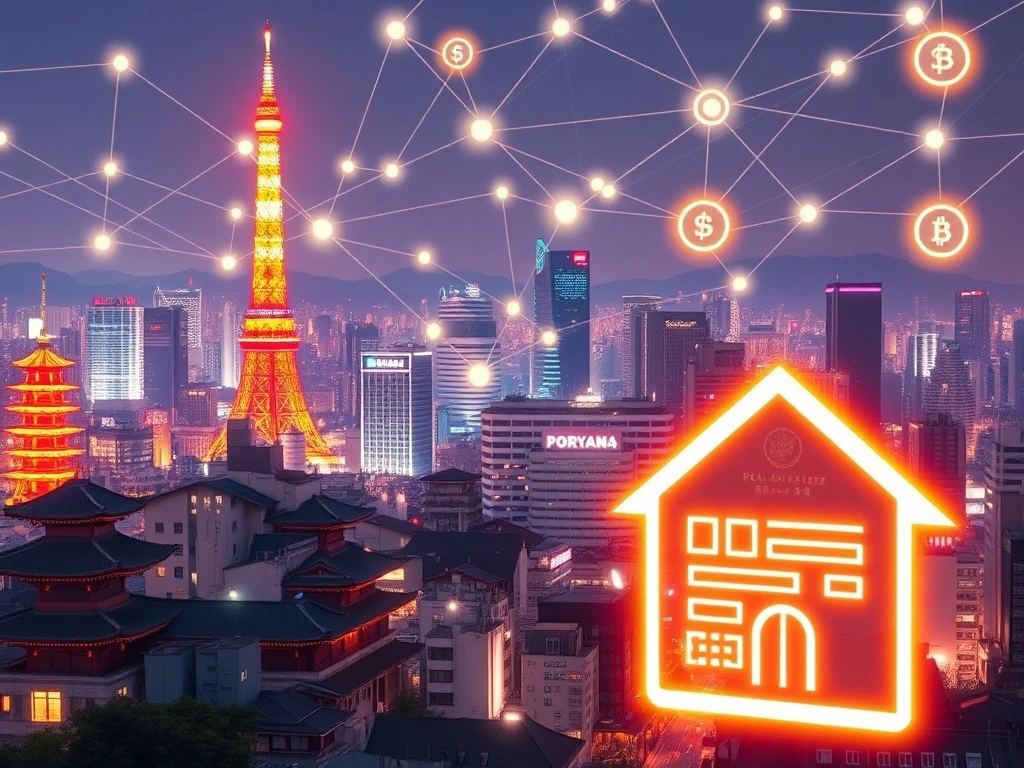Real Estate Tokenization: Japan Unlocks $75M Tokyo Properties on Oasys Blockchain

A seismic shift is underway in the world of finance, and Japan is leading the charge. The recent announcement that Gates Inc. will tokenize $75 million worth of prime Tokyo real estate on the Oasys blockchain isn’t just news; it’s a blueprint for the future of investments. This monumental step into real estate tokenization signals a new era where illiquid assets become accessible digital assets, potentially transforming how we buy, sell, and invest in properties globally.
Unlocking Value: Japan’s Monumental Real Estate Tokenization Initiative
Gates Inc., a prominent Japanese real estate investment firm, is embarking on one of the country’s largest real estate tokenization projects. Partnering with Oasys, a blockchain platform initially known for gaming, this initiative will see $75 million in central Tokyo properties converted into digital tokens. This initial phase is ambitious, aiming to expand liquidity significantly, with Gates eventually planning to tokenize over $200 billion in assets – a substantial 1% of Japan’s entire real estate market.
This move is particularly significant given Gates Inc.’s strong financial standing, having generated $145 million in 2024 revenue and earning a spot on the Financial Times’ “High-Growth Companies Asia-Pacific 2023” list. Their current Nasdaq roadshow, following an F-1 prospectus filing, further underscores their commitment to innovation and global expansion.
Oasys Blockchain: Powering Japan’s Digital Asset Future
The choice of Oasys blockchain for this groundbreaking venture highlights its growing versatility beyond its gaming origins. Oasys is positioning itself as a robust platform for digital assets, capable of handling the complexities of real-world asset (RWA) tokenization. Oasys founder Ryo Matsubara emphasized their focus on building a token economy designed to maximize compounding effects through automatic reinvestment of returns. This strategic partnership leverages Oasys’s technical capabilities to create a secure and efficient infrastructure for these new property tokens.
What is RWA Tokenization and Why It Matters for Japan Properties?
RWA tokenization refers to the process of converting rights to real-world assets into digital tokens on a blockchain. For Japan properties, this means:
- Increased Liquidity: Traditionally, real estate is illiquid. Tokenization breaks properties into smaller, tradable units, making them easier to buy and sell.
- Fractional Ownership: Investors can own a fraction of a high-value property, lowering entry barriers.
- Transparency & Efficiency: Blockchain provides an immutable record of ownership and transactions, reducing intermediaries and costs.
- Global Accessibility: International investors can more easily participate in the Japanese real estate market.
Gates CEO Yushi Sekino confirmed that the company has secured the necessary financial and real estate business licenses in Japan. The RWA project will be executed through an overseas-established special purpose vehicle (SPV), ensuring full compliance with local and international regulations. He stated, “We are actively preparing to ensure full compliance with local regulations and secure the required licenses in the relevant jurisdictions through a strong partnership.”
Expanding Horizons: The Global Impact of Japan Properties on Blockchain
The vision extends far beyond Tokyo. Gates and Oasys plan to expand this tokenization model internationally, targeting major markets like the United States, Europe, the Philippines, and other parts of Asia. This international ambition signals a potential wave of cross-border digital assets investment, with Japan properties leading the way. Moreover, the initiative could eventually include tokenized Japanese intellectual property, such as gaming and anime assets, diversifying the scope of tokenizable RWAs.
This move by Japan aligns with a surging global interest in real estate tokenization. Dubai has seen $18 billion in tokenized real estate sales, and New Jersey is digitizing $240 billion worth of property deeds. A Deloitte report predicts the global market for tokenized real estate to exceed $4 trillion by 2035, a massive leap from less than $300 billion in 2024, demonstrating a compound annual growth rate (CAGR) of over 27%.
The Future is Digital: How Tokenization Reshapes Investments
The overarching theme here is the transformation of investments through digitalization. As Polygon Labs CEO Mark Boiron highlighted, tokenization is poised to revolutionize real estate by solving its inherent liquidity issues. Illiquidity often leads to ‘illiquidity discounts,’ where assets are valued lower due to difficulty in selling them quickly. Tokenization directly addresses this by creating liquid markets for traditionally illiquid assets.
Institutional investors are also taking notice. Pan-European fund manager APS recently acquired $3.4 million worth of tokenized real estate assets via MetaWealth’s blockchain platform, underscoring the growing mainstream acceptance and confidence in these digital assets.
A Pioneering Path for Global Finance
Japan’s pioneering step in tokenizing significant real estate on the Oasys blockchain is more than just a transaction; it’s a strategic move that positions the nation at the forefront of the real estate tokenization revolution. By enhancing liquidity, enabling fractional ownership, and ensuring compliance, this initiative sets a powerful precedent for how global real estate and other real-world assets will be managed and traded in the digital age. The future of investments is increasingly digital, and Japan is showing us the path forward, demonstrating the immense potential of RWA tokenization to unlock value and create new investment opportunities worldwide.









